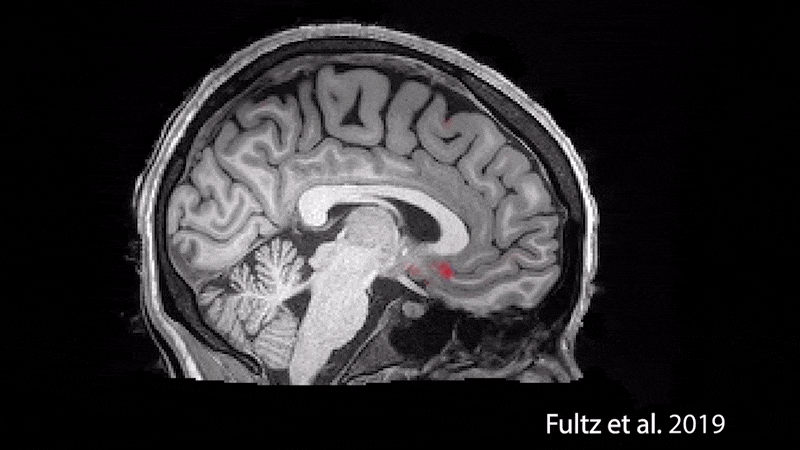What happens in your brain while you sleep?
It gets a "bath," among other things.

Our brains are complex and elaborate. They contain billions of neurons, don't fully form until we reach age 25, and can generate around 25 watts of power — enough to illuminate a light bulb.
Scientists are constantly learning new information about how the brain functions, but what do we know about how this incredible organ operates during sleep? Is it a total mystery, or are there some things we know for sure?
Well, for one, we know it's important. "Every animal on this planet that we have observed carefully has been shown to sleep — even fruit flies, roundworms, and jellyfish," Dr. David Raizen, an associate professor of neurology at the University of Pennsylvania, told Live Science in an email. "Hence, sleep must be serving a very important function, which has led to its persistence throughout evolution."
"This is especially noteworthy because sleep incurs costs," Raizen added. "Animals are vulnerable to predation during sleep and they are not productive — they do not forage for food, and they don't reproduce."
Related: Why can't we remember our dreams?
Research has found that we spend one-third of our lives either asleep or attempting to sleep. That means, if you live to age 76 (the average life expectancy in the U.S. in 2021, according to the Centers for Disease Control and Prevention), you'll likely spend around 25 years of your life sleeping.
When we don't sleep well or often enough, "we function poorly," Raizen said, adding that a person's ability to think and operate effectively can be evident if sleep is disrupted for even one night.
Get the world’s most fascinating discoveries delivered straight to your inbox.
"Since the largest deficits of sleep deprivation are experienced by the brain, we think the brain is the main organ affected in human sleep deprivation," Raizen said. "Sleep, therefore, must be very important for healthy brain function."
According to the National Institute of Neurological Disorders and Stroke (NINDS), there are "two basic types of sleep: rapid eye movement (REM) sleep and non-REM sleep." They are both associated with particular types of brain waves and specific neuronal activity. Non-REM sleep occurs as we move from being awake to being asleep, a time when our brain waves slow down. At the same time, our muscles start to relax, and breathing becomes slower than it is during the day.
REM sleep, on the other hand, sees brain wave activity operate at a level very similar to wakefulness. Research has found that REM sleep constitutes between 20% to 25% of our sleeping time, and is when our dreams tend to be the most bizarre and implausible.
During REM sleep, which is when dreams are most active, the thalamus — a large mass of gray matter found in the middle of the brain — sends "images, sounds, and other sensations that fill our dreams," according to NINDS.
The neurotransmitter acetylcholine, a chemical that spikes during waking hours, is also strong during REM sleep, according to Johns Hopkins Medicine. When you are awake, acetylcholine appears to help the brain keep information gathered, and it likely helps you remember this information while you sleep. That's why studying just before bedtime and then "sleeping on it" can help you remember key facts the next day.
As we fall asleep, our brain experiences a pattern of brain waves known as "spine spindles," which, according to the Sleep Foundation, are not fully understood, but are thought to "play a role in learning and integrating new memories." Spine spindles may also play a role in ensuring we remain asleep even when our brains encounter outside stimuli.
During sleep, the brain even washes itself in a juicy blend of cerebrospinal fluid and blood, a 2019 study in the journal Science found. Understanding the nature of this wash cycle could help uncover new information about "age-related impairments" as well as "a variety of neurological and psychological disorders that are frequently associated with disrupted sleep patterns, including autism and Alzheimer's disease," the researchers said in a statement.
Related: Why do we breathe so loudly when we sleep?
Our brain keeps us alive when we are both asleep and awake, but according to Raizen, there are certain things the brain prefers to do after we drift off.
"There are some brain processes that are observed to preferentially occur during sleep," Raizen said. "These include the secretion of growth hormone in humans, the clearance of waste metabolites [that build up during waking hours], changes in metabolism, and changes in the strength of communication between brain cells (neurons)."
A 2017 study in the journal Nature Medicine found that "sleep deprivation disrupts brain cells' ability to communicate with each other," which "leads to temporary mental lapses that affect memory and visual perception," according to a statement. The study's lead author, Dr. Itzhak Fried, a professor in residence and director of the Epilepsy Surgery Program at the University of California, Los Angeles, noted that "starving the body of sleep also robs neurons of the ability to function properly."
This is a point supported by NINDS, which says "quality sleep is as essential to survival as food and water. Without sleep you can't form or maintain the pathways in your brain that let you learn and create new memories, and it's harder to concentrate and respond quickly."
Although it's clear that there's a link between poor sleep and certain negative health outcomes — type 2 diabetes, cardiovascular disease, obesity and depression, to name just a few — Raizen said that some mystery remains around the nature of the relationship, and that it would be unwise to draw definitive conclusions based on the data currently available.
- Related: Is it bad to eat before bed?
- Related: Should you exercise before you sleep?
"There are many observed poor health conditions that correlate to poor or reduced sleep," he said, but "it is difficult to know whether poor sleep causes these problems. For example, it is feasible that very early dementia causes poor sleep, rather than vice versa."
But all sleep is not equal, and its impact on our health can vary depending on the circumstances. So, while various studies have revealed that sleep plays a very necessary role in keeping humans healthy and is vital for adequate brain function, Raizen said, there are still many questions about sleep and its association with the brain that remain unanswered.
"Outside of the big question around why we sleep, there are many mysteries about how we sleep," Raizen said. "What are the brain centers involved in initiation, maintenance and termination of sleep? What are the brain chemicals involved in this? How does the brain switch from rapid eye movement (REM) sleep to non-REM sleep?"
The only way to solve these puzzles, according to Raizen, is for scientists to conduct more research.
Originally published on Live Science.

Joe Phelan is a journalist based in London. His work has appeared in VICE, National Geographic, World Soccer and The Blizzard, and has been a guest on Times Radio. He is drawn to the weird, wonderful and under examined, as well as anything related to life in the Arctic Circle. He holds a bachelor's degree in journalism from the University of Chester.
 Live Science Plus
Live Science Plus







